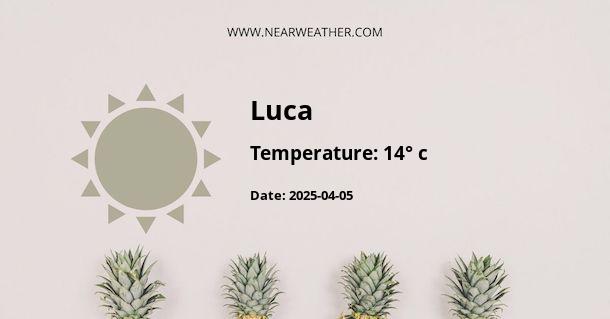An In-Depth Look at Lucca, Italy: A Climate Overview
Nestled in the heart of Tuscany, Lucca is a city of immense historical significance and beguiling charm. Its climate is quintessentially Mediterranean, typified by mild winters and warm to hot summers, making it an appealing destination for visitors year-round. In this detailed climate guide, we will delve into the climatic nuances of Lucca, offering insights that may help not only travelers but also researchers and enthusiasts to understand what makes the weather in this Italian jewel tick.
Lucca's Climate Zones and Influencing Factors
The city of Lucca lies within the Köppen climate classification Csa zone, which is characterized by its temperate qualities, with dry and warm summers. Geographically, Lucca is positioned in proximity to the Ligurian Sea, and it also benefits from the sheltering presence of the Apuan Alps to the north. This geography significantly influences the climatic conditions of the city.
Seasonal Climate Patterns in Lucca
Lucca's climate has distinctive patterns that mirror the seasons of the year. Below we delineate each season with its average climatic conditions.
Spring (March - May)
- March signals the onset of spring in Lucca, with average high temperatures of 15°C (59°F) and lows of 5°C (41°F).
- By May, the temperatures often rise, reaching an average high of 22°C (72°F) and lows of 11°C (52°F).
- Precipitation during this period begins to decline, yet it remains relatively moderate with occasional showers.
Summer (June - August)
- Summertime brings peak temperatures, with July being the hottest month, boasting averages between 29°C (84°F) for the highs and 16°C (61°F) for the lows.
- Rainfall is at its lowest during this period, resulting in numerous sunny days.
- Lucca's summers are also marked by Lucchesi breezes, which temper the heat, especially in late afternoons.
Autumn (September – November)
- The autumn months usher in cooler weather, with temperature averages ranging from highs of 25°C (77°F) in September to lows of 6°C (43°F) in November.
- Rainfall increases significantly in autumn, with November being usually the wettest month of the year.
- The changing foliage provides a picturesque backdrop to Lucca's historic walls and structures.
Winter (December - February)
- Winter is relatively mild, with average highs of 10°C (50°F) and lows around 1°C (34°F) in January, the coldest month.
- Snowfall is rare but possible, typically leading to brief and picturesque scenes rather than long-term accumulation.
- Humidity levels may rise during this season, contributing to a chillier feel in the air.
Annual Weather Statistics for Lucca
Let’s assess some of the notable numerical climatic details with the use of a table, presenting the statistical averages which characterize Lucca’s climate throughout the year.
| Month | Average High (°C) | Average Low (°C) | Average Rainfall (mm) |
|---|---|---|---|
| January | 10 | 1 | 78 |
| February | 12 | 2 | 75 |
| March | 15 | 5 | 80 |
| April | 18 | 8 | 90 |
| May | 22 | 11 | 70 |
| June | 26 | 15 | 50 |
| July | 29 | 16 | 30 |
| August | 29 | 16 | 40 |
| September | 25 | 14 | 100 |
| October | 21 | 10 | 140 |
| November | 15 | 6 | 120 |
| December | 11 | 2 | 93 |
Extreme Weather and Climate Events
Lucca is largely shielded from extreme weather; however, occasional heatwaves can occur during the summer, driving temperatures well above the average. On the other end of the spectrum, infrequent cold spells in winter might bring unexpected frost, though this is not a common occurrence. Autumn and winter months might bear witness to heavy downpours and thunderstorms, occasionally leading to local flooding in the surrounding areas, including the Serchio river basin.
Climate Adaptations and Sustainability Efforts
In response to global climate challenges, Lucca has implemented sustainability efforts such as enhancing green spaces and improving waste management. The promotion of cycling and pedestrian zones within the historic city center not only preserves its architectural heritage but also reduces carbon emissions. Additionally, Lucca's investment in renewable energy sources and efficient public transport systems reflects the city's commitment to an environmentally friendly and sustainable future.
Future Climate Projections
Looking ahead, climate models suggest that Lucca’s weather may experience higher average temperatures and a propensity for more extreme weather events. The trend towards hotter summers and the possibility of reduced precipitation poses challenges for agriculture, water supply, and the preservation of Lucca’s historic landmarks. Anticipating these changes, local authorities are focusing on climate resilience strategies to safeguard the city's future.
Conclusion
In conclusion, the climate in Lucca is akin to much of central Italy's Mediterranean coastline – mild and pleasant for much of the year, with ample sunshine and moderate rainfall. Attention to historical data and future projections plays a vital role in the adaptation and sustainability of Lucca’s environment. Whether you're planning a visit or studying climate patterns, Lucca exemplifies the broader climatic narrative of the Mediterranean basin, with its inherent beauty and emerging challenges in the face of a changing global climate.
A - Luca's Latitude is 46.011940 & Longitude is 12.363610.
A - Weather in Luca is 11° today.
A - Climate Conditions in Luca shows moderate rain today.
A - Humidity in Luca is 95% today.
A - Wind speed in Luca is 9.25 km/h, flowing at 40° wind direction. today.
